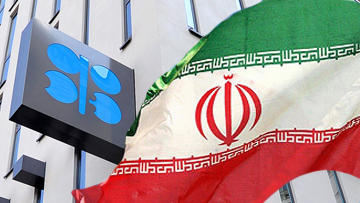
OPEC crude production fell by 240,000 barrels per day in February to 30.68 mill barrels, the lowest level in four years.
February numbers show a significant cut over compliance, with Saudi
Arabia leading the way with a 153% compliance rate, already some 170,000
barrels per day below the overall target. Iraq and Saudi Arabia
contributed 170,000 barrels in additional cuts between them in February
alone, Gibson Shipbrokers said in a report.
However, having already cut production close to their original 2019
target, they may now be missing the opportunity to capture market share
in the face of rising demand.
The impact of sanctions on crude supply may soon increase. Although
Iran is exempt from OPEC’s cuts, in seven weeks waivers for Iranian
crude are set to expire.
Some of Iran’s biggest customers - China, India, Japan and South Korea -
are all partially exempt from the current US oil sanctions on Iran,
however this may soon change.
Last week, IEA data showed Iranian crude production had fallen to 2.85
mill barrels per day in February, its lowest level since the first
quarter of 2015, when Iran was under previous sanctions.
In 2018, Iran exports averaged almost 2.5 mill barrels per day, with
over 1 mill going to China and India. The US Administration has not yet
revealed whether any of these waivers will be extended, leaving those
countries potentially having to replace over 1 mill barrels per day from
elsewhere.
However, this may not be as easy as it sounds. Obvious sources, such as
Venezuela and Iraq, are already under sanctions or participating in
OPEC cuts. This may now leave OPEC wondering whether deeper cuts are
appropriate considering many refineries in the region are optimised for
heavier crudes.
The tightness in the heavy crude market is also exacerbated by greater
US appetite to replace Venezuelan barrels with heavy grades already in
short supply. Incremental supplies from Canada are also limited, owing
to government enforced production cuts.
Recent reports from Reuters said that the US aims to cut Iran’s exports
by a further 20% to below 1 mill barrels per day, saying that they were
unwilling to cut anymore over price hike fears, backtracking on
previous statements to cut their exports to as close to zero as
possible.
However, analysts have indicated that India could be willing to cut all
Venezuelan crude imports to satisfy US sanctions in return for further
waivers on importing Iranian crude.
This would potentially starve Venezuela of its last major‘cash’ buyer
although simultaneously, it would cause a headache for some Indian
refiners that prefer Venezuelan grades. However, the situation in
Venezuela looks like it will get worse before it gets better.
The heavy crude market is already incredibly tight and production cuts
come at a time when demand for heavy grades is rising.This is
significant, as greater demand for heavy grade crudes will have to be
sourced from elsewhere, especially when we start to exit the
Asia/Pacific maintenance season and new refineries come online.
With production cuts coming from the main heavy grade producing
regions, refiners may have to look West to replace their missing barrels
thus supporting tonne/mile demand from West to the East.
With US production posting strong growth this year, OPEC cuts are to be
largely offset, perhaps justifying the organisation’s current stance
even if there’s a mismatch of grades.
Meanwhile, Reuters has reported that the Maritime Authority of Panama
(AMP) has removed 59 Iranian-linked ships from its registry, quoting
ShareAmerica, the US State Department-run platform.
The move came after Juan Carlos Varela, Panamanian President, issued a
presidential decree last month, allowing the AMP to de-register the
vessels.
Out of these, at least 21 Iranian-owned tankers have had their registration revoked, Reuters reported.
In 2016, Iran and Panama agreed to add Iranian tankers to the
Panamanian flag, which has now been dissolved due to the sanctions.
We CLOSED JOINT-STOCK COMPANY AGS OIL is one of the leading Oil & Gas trading companies in Russia Federation with good business reputation and well experienced in the Petroleum and mining sector. We offer the following trades through our reliable Refineries: D2 DIESEL OIL GOST 305-82, JP54 AVIATION KEROSENE COLONIAL GRADE, UREA 46%/PRILLS, LNG, LPG, REBCO, MAZUT100 GOST 10585-75/99, AUTOMOTIVE GAS OIL(AGO). We as well secure allocations from our various Refineries for our numerous buyers who are interested in Spot transactions on FOB/CIF deliveries to any world safe port (AWSP). Our Refineries have their products both at Russian ports and Rotterdam port. we also have a reliable SHIPPING COMPANY if you are in need of find the contact bellow.
ReplyDeleteEmail: baevsergeyalexandrovich@bk.ru
BAEVSERGEY ALEXANDROVICH.